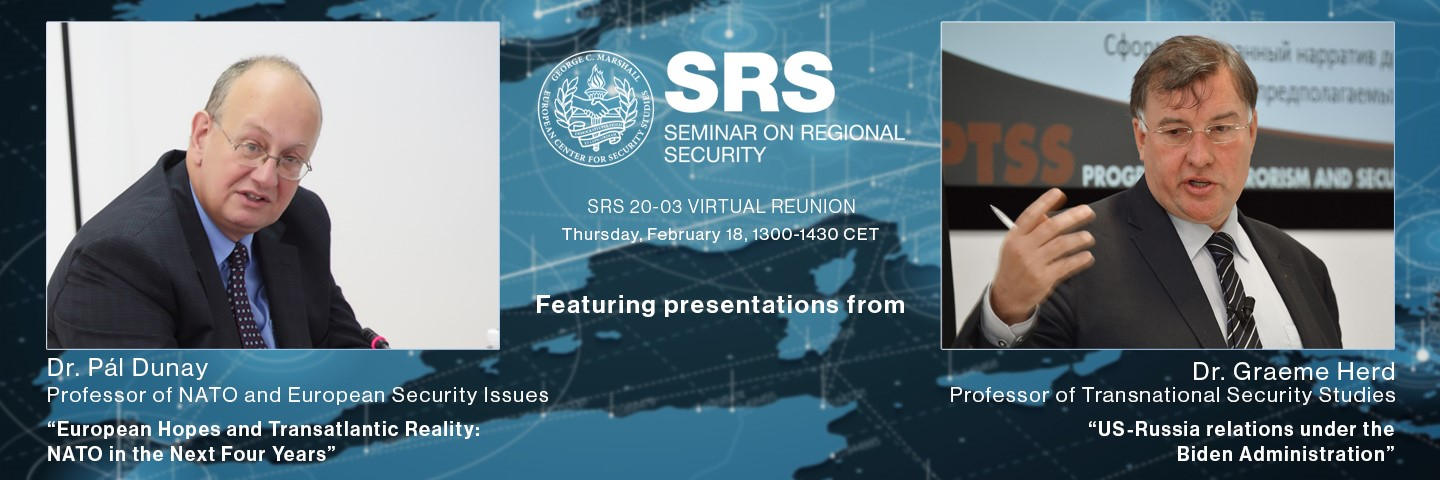
“European Hopes and Transatlantic Reality: NATO in the next four years” and “US-Russia relations under the Biden Administration”
“European Hopes and Transatlantic Reality: NATO in the next four years” and “US-Russia relations under the Biden Administration”
Virtual Online Seminar
Marshall Center Seminar for Regional Security (SRS) military professors COL (GS) Stefan Hinz, COL (GS) Günther J. Rozenits, and Alumni Relations Specialist CPT Jochen Richter, with GCMC professors Dr. Pál Dunay and Dr. Graeme Herd.
The Seminar on Regional Security (SRS) is a well-established education format of the George C. Marshall Center. Since its inception, 371 participants from 47 nations have participated this three weeks course. Participants come from a wide variety of countries: 121 from The Western Balkans / Southeastern Europe, 62 from the Caucasus Region and Central Asia, 65 from Eastern Europe countries, 26 from the Baltic States and 18 from the African continent. The United States contributed with 39 and Germany sent 13 students. In addition, 27 other participants came from e.g. Australia, Republic of Korea, the Middle East and some Western European countries.
In order to keep them informed and take advantage of current international developments, the SRS Leadership, COL (GS) Stefan Hinz and COL (GS) Günther J. Rozenits, in cooperation with the Alumni Relations Specialist CPT Jochen Richter, invited participants from SRS 2020 to a special reunion and topical lecture, and more than fifty percent registered for the event. On February 18, 2021, Dr. Pál Dunay, Professor of NATO and European Security Issues, presented “European Hopes and Transatlantic Reality: NATO in the next four years”, and Dr. Graeme Herd, Professor of Transnational Security Issues, recited about “US-Russia relations under the Biden Administration”.
The key messages were:
- New atmosphere between USA and Europe - America is back!
- Diplomacy and reliability will mark the next four years within the Western hemisphere.
- The US faces several domestic problems and wants "results-oriented" multilateralism.
- NATO remains the US's European security forum and fair burden sharing is appropriate.
- The UK has left the European Union and Europe's major players face elections and leadership changes over the next two years.
- The so-called European “strategic autonomy” needs to be defined more clearly and should not impair transatlantic cooperation, with the European Union as a partner.
- A common perception and coordination of threats and challenges across the Atlantic in relation to Russia and China is more necessary than ever.
- Russian malign influence is unchanged and she fights NATO by all means, except hot war.
- Russia defends her near abroad and acts to avoid instability and fears color shifts.
- Russia’s main aim is to divide western unity and –if necessary- break relationship with the European Union (“extreme destructive behavior”).
- The U.S. has found common ground with Russia for a first arms agreement (New START, extended until February 5, 2026).
- What happens after US President Donald Trump and US President Joe Biden?
Both professors talked about future trends in the relations within the Alliance and with Russia, referred to a leverage of the West over Russia, underlined both the values-based transatlantic relationship and joint strategic interests, and called for some cooperation with Russia and China, and warned from trade and technological dependence on China – “there is no option for the West.”
The 40 participants challenged the lecturers with interesting and precise questions. COL Hinz and COL Rozenits summed up that the relationship with Russia and China is a very, very long game. This includes the Russian influence in nearby foreign countries, especially in Ukraine, the South Caucasus, and even Serbia. The USA must reengage with neglected regions and coordinate more closely with European partners, especially in the Western Balkans / Southeast Europe. In the South Caucasus the new situation offers the chance for a common and positive future.
Overall, the online event once more deepened the constructive network between the Garmisch-Partenkirchen based Center and its alumni on four continents, who work as security professionals with the Seminar on Regional Security Community.
Event Details
Completed Event